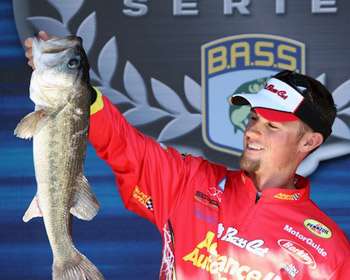
Missing fish on a spinnerbait or buzzbait is as common as peanut butter and jelly. Chances are, if you fish either bait, you will end up having a fish "short strike" the bait at some point in the day.
To combat this occurrence, many anglers like to add a trailer hook attached to the bait's main hook to increase their odds of hooking up.
Oftentimes anglers are hesitant to fish these baits around heavy cover due to the dangling trailer hook's propensity for getting snagged. "I generally will use the type of cover I'm fishing around to dictate whether or not I'll have a trailer hook," Elite Series pro John Crews explains.
"If I'm fishing around really heavy cover — wood or grass — I'm less inclined to use one because of the increased potential of getting hung up. If I think I can get away with using a trailer hook, I will." Since Crews rarely fishes a spinnerbait in open water, that should tell you something.
However, Crews explains that if given his choice, he'd rather not have to use a trailer hook, but rarely takes a chance by not having one in place. "I'm two-to-one in favor of having a fish on the main hook because it's got fewer failure points," he says. "At the end of the day though, I'm more in favor of having the fish on any hook at all, which is the reason that I'll use a trailer hook."
On a buzzbait, Crews says that he uses a trailer hook "about half the time," whereas on his spinnerbait, he says that it's "a little more than that." This is particularly true when he adds a plastic trailer to either bait.
"When you add bulk to the back of either bait, it's especially important to add a trailer hook to it. If you don't, the fish will have a tendency to strike at the bulkiest part of the bait, and in many cases will miss the main hook."
Crews explains that he prefers a single, straight-shank, 2/0 or 3/0 hook designed to be a trailer hook, and never uses multiple trailer or treble hooks as a "stinger" trailing the bait. "I've experimented with that some, but I've never had much success with it," he says. "I actually feel like it impedes some of the action in the bait, and if your fish are striking it that short, to the point that you need multiple trailer hooks, you're more than likely fishing the wrong color."
Short strikes, while somewhat common when fishing either a spinnerbait or buzzbait, aren't necessarily the deciding factor when determining whether a trailer hook should be employed, according to Crews. "If you're getting seven out of 10 fish on your main hook, and only three out of 10 are getting the trailer, you're pretty much dialed in," he says.
"On the other hand, if only three are hitting the main hook, you need to change colors or retrieve speed." Water clarity also impacts Crews' decision making process when it comes to trailer hooks. "The clearer the water, the more it seems like you need a trailer hook," he says.
"If you're dialed in to the right color in stained water, you can get away with not having a trailer hook because the bass can't get a good look at the bait. "But in super-clear water, even if you're burning it, you need the trailer hook."
(Provided by Z3 Media)




